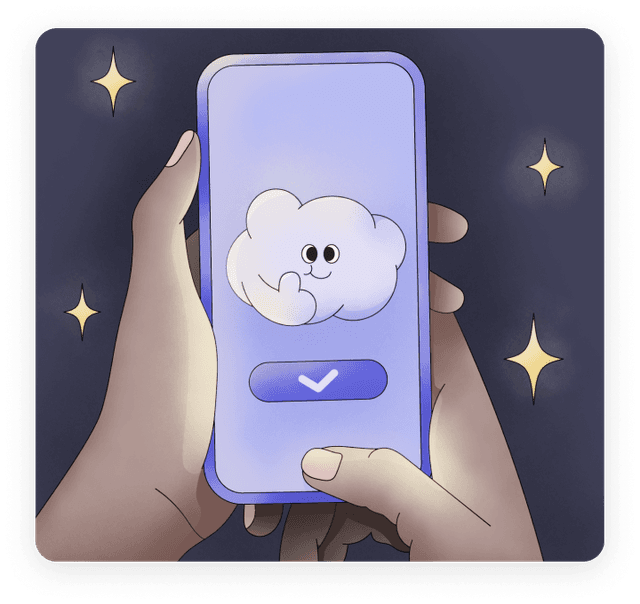
Denys Chumak
16 Oct 2023
How To Control Your Dreams?
Have you ever gone to sleep expecting to wake up in the middle of the night with a solution or revelation? Perhaps you're facing a tough circumstance in your life that you're finding difficult to understand or a tough choice you need to make. If you understand how to control your dreams, then your dreams can be a source of knowledge and direction.
You may teach your mind to be attentive during your dreams and even to consciously direct them by using practices like reality checks, intention setting before bed, and dream journaling.
Dream Interpretation: Why Do We Dream, and What Does It Mean?
Have you ever questioned whether you have any control over your dreams or why you dream? People have been captivated by dreams for ages. Scientists have some beliefs about what dreams could represent and how you might be able to affect them, even though they still don't fully understand why we dream.
Why do we dream?
Several popular ideas explain why humans dream, including:
1. Memory consolidation: Dreams may aid in the processing and consolidation of our daily events and recollections. While we sleep, our mind connects the dots between experiences, memories, feelings, and sensory information.
2. Emotional control: Dreams may aid in the processing of feelings and mood management. The subconscious mind can process anxiety, trauma, worries, and other emotional events through dreaming.
3. Solving problems: Our minds may use our dreams as a means of working through issues we encounter throughout the day. Dreams' strange and fantastical qualities enable our imaginations to form novel and uncommon connections.
4. Meaningless: According to some scientists, dreams are random and have no real significance. They are merely an effect of other sleep-related procedures. Although conceivable, this idea fails to take into account how vivid, intricate, and deeply personal dreams may be for many individuals.
Also read: Why Do We Dream? A Theory On How Dream Protects Our Brain?
How to control your Dreams?
Some people engage in lucid dreaming, a method for becoming conscious and in charge of your dreams. You can become aware of your dreams and possibly have an impact on them if you regularly practice reality checks, intention setting, and meditation before bed.
Most of us will always find dreams enigmatic and uncontrollable. You might, however, learn more about your waking life's emotional experiences, hopes, anxieties, and other elements by examining the themes and symbolism in your dreams. Maintaining a dream diary and analysing the meanings can be a very insightful exercise.
How to Become Lucid: Methods for Managing and Guiding Your Dreams
Being conscious of your dreams while you are still asleep is the first step toward clarity. You can discover strategies to affect your dreams in addition to becoming lucid with practice. Here are a few techniques to help you take charge of and make sense of your dreams:
Checks of Reality. To develop the habit, ask yourself frequently if you are dreaming when you are awake. This habit could activate when you're dreaming, enabling you to recognise when you're asleep. To feel weightless, try switching a light switch, double-checking the time, or jumping. You're likely dreaming if something is off.
Recall dreams. As soon as you wake up, write down your dreams in the dream journal you keep next to your bed. By doing this, you can train your mind to recall more specifics from your dreams. The likelihood of experiencing lucid dreams increases with your awareness of the telltale symptoms of a dream.
Premeditation. Before going to sleep, picture yourself in your dreams waking up and becoming coherent. Say something aloud, such as "I will know I'm dreaming." You can use this deliberate intention for your dreams.
Veracity Steers. Select an item, such as a jewel, to stand in for your objective. Hold it, look at it, and see yourself being clear-headed. By physically enacting your intention, you raise your chances of having lucid dreams.
Wake Initiated Lucid Dreams (WILDs). When you go to sleep, lie still and maintain mental awareness even while your body drifts off to sleep. You can go straight into a lucid dream by doing this, which enables your mind to enter a dream state while retaining awareness. Despite being difficult, WILDs can result in extremely vivid, clear dreams.
You'll be able to identify when you're dreaming and even control your dream experiences with consistent use of these techniques. Although achieving complete lucidity requires commitment, even modest improvements in consciousness and memory can offer a valuable understanding of your own psyche and spiritual path.
Also read: The Science Behind Lucid Dreams
Using Lucid Dreaming to Gain Guidance and Personal Development
Have you ever questioned whether you have any influence on your dreams? Yes, it is possible to achieve this through lucid dreaming. With enough effort, you can even intentionally control the events of your dreams while you're asleep. A useful technique for discovering more about oneself, facing anxieties, and unleashing creativity is lucid dreaming.
How to Bring on Hallucinations
You might attempt the following methods to raise the likelihood that you will experience lucid dreams:
Reality checks. Throughout the day, check in with yourself to see if you are dreaming. This is a behaviour that can help you recognise when you are dreaming.
Dream memory. As soon as you wake up, record your dreams in a dream notebook. This enhances your ability to recall dreams and recognise reoccurring themes in your dreams.
Illustration. Imagine yourself realising you are dreaming as you go off to sleep. A mantra such as "I will know I'm dreaming" should be repeated. This helps you to concentrate on experiencing lucid dreams.
Wake Initiated Lucid Dream or WILD. While lying in bed, let your body unwind and your mind remain focused. This enables you to enter a lucid dream state straight from a level of consciousness as your body goes to sleep. Although it requires practice, this has great potential.
Also Read: Why do we dream?
Opportunities and Development
The opportunities are infinite if you become proficient at lucid dreaming. One may:
1. Confront your anxieties in a safe environment. Overcoming them in your dreams can assist in lowering anxiety levels during the day.
2. Make use of your imagination. Lucid dreams are great for imagining new concepts, solutions, and artistic or musical creations. Keep a dream journal to get inspiration.
3. Learn more about who you are. Aspects of yourself or your life's journey may be represented by the things, people, and events in your lucid dreams. Consider the significance and advice included in your dreams.
4. Discover a sense of belonging. When you feel lost or alone, talking to dream characters or your inner guide might help you find your way. Dreams might provide the answers you're looking for.
You can master the art of lucid dreaming by using the techniques regularly and by thinking critically about the significance of your dreams. Lovely dreams!
Conclusion
In this blog, you have to understand how to control your dreams. You really can have power over your dreams now that you know this. You can control your dreams by training your mind to become conscious and lucid during sleep. This may be achieved with patience and practice.
Once you recognise that you are dreaming, begin to practice reality checks, keep a dream journal, and see what you can accomplish. You can also take the help of DreamApp to analyse the symbolism of your dreams. The possibilities in your dream world are only limited by your creativity. Why not give it a try since you have nothing to lose? Happiest of dreams and exploration!
FAQs
How to control your dreams, especially through lucid dreaming techniques?
The ability to lucid dreams can be acquired via a variety of methods, including reality checks, keeping a dream journal, and daily mindfulness exercises. These techniques assist you in realising that you are dreaming, which enables you to manage your dreams.
Why do we dream, and how does it relate to controlling our dreams?
Dreaming is still not fully understood, but it is believed to serve several purposes, including processing emotions and experiences. Learning to control your dreams, particularly through lucid dreaming, can be a way to explore your subconscious mind and gain insights into your thoughts and emotions.
Can controlling your dreams help interpret dream meanings or symbolism?
Yes, when you can control your dreams, you have the opportunity to interact with dream elements and symbols consciously. This can aid in understanding the meaning behind recurring themes or symbols in your dreams, providing insight into your subconscious thoughts and emotions.
What are some common techniques for achieving lucid dreaming and dream control?
Common techniques for achieving lucid dreaming include reality checks (habitually questioning if you're dreaming), maintaining a dream journal (recording your dreams regularly), practising meditation and mindfulness, and using mnemonic induction to enhance dream recall.
Is it possible to learn how to control your dreams, or are some people more naturally inclined to do so?
While some individuals may have a natural predisposition to lucid dreaming, you can learn how to control your dreams with dedication and practice. It may take time and patience, but the techniques and methods mentioned earlier can be effective for most people in achieving dream control and lucid dreaming experiences.
Did you have an unusual dream with this symbol?
Let's analyze this dream with our expert!
At least five words, please.

Your dreams are completely private
Take control of your dream emotions in the free mobile app



The most recent users' dreams
Go to the user dreams page
Dream App
Free dream interpretations

(1,213)











